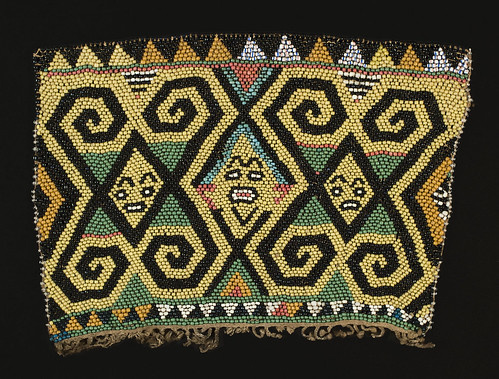To satisfy Anaxagorean narrative conventions, Cantor's definition of a set, and Pauli's exclusion principle, we require that every seed Z is perfectly distinct. Therefore seed counts always report a positive integer or zero, not fractions or negative numbers
$N^{\sf{Z}} = 0, \, 1, \, 2, \, 3 \ \ldots \ \ \forall \, \sf{Z}$
Then because quarks are defined by pairs of seeds, quark coefficients must always be non-negative integers as well
$n^{\sf{q}} = 0, \, 1, \, 2, \, 3 \ \ldots \ \ \forall \, \sf{q}$
Recall that a logical style of description employing mathematics requires that seeds are indestructible. For the same reason, when we define quarks from seeds, and shift the description to counting quarks, then quarks must be indestructible too.
 |
| Bead Panel from a baby carrier, Basap people. Borneo 19th century, 27 x 19 cm. From the Teo Family collection, Kuching. Photograph by D Dunlop. |
So the overall quantity and quality of the quarks in a description cannot change. Whenever some compound quarks $\mathbb{X}$, $\mathbb{Y}$ and $\mathbb{Z}$ are combined or decomposed, if
$\mathbb{X} + \mathbb{Y} \leftrightarrow \mathbb{Z}$
then the coefficients of any type of quark q are related as
$n^{\sf{q}} \left( \mathbb{X} \right) + n^{\sf{q}} \left( \mathbb{Y} \right) = n^{\sf{q}} \left( \mathbb{Z} \right)$
And a sum over all types of quarks N is constrained as
$N^{\mathbb{X} } + N ^{ \mathbb{Y} } = N ^{ \mathbb{Z} }$
These relationships are the logical basis for a variety of conservation laws that are found throughout physics. We often refer back to them in the articles that follow.
Here is a link to the most recent version of this content, including the full text.
| Quarks are Conserved |
